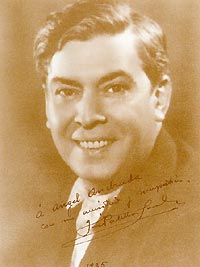|

José
Padilla
(1889 - 1960)
|
 José
Padilla Sánchez (b. Almería, 28 May 1889) trained in his home
town, at the Madrid Conservatory and in Italy, before commencing his musical
career. José
Padilla Sánchez (b. Almería, 28 May 1889) trained in his home
town, at the Madrid Conservatory and in Italy, before commencing his musical
career.
He rapidly became immersed in Madrid theatre life, and the
first of his large output of zarzuelas was La Mala hembra (1906), a
one-act sainete to a libretto by Ventura de la Vega, grandson of
the well-known writer of the same name, who was to be a regular collaborator in
his early years. A string of one-act sainetes and revistas
(revues) followed, amongst which Juan Miguel (1909); Los viejos
verdes (1909, with Quinito Valverde) and
Luzbel (1917, with Miguel Nieto) should be mentioned. There was
also an opera - La Faraona, to a text by Mantilla de los
Rios.
He later spend much time in Paris, where he wrote the scores
for two opérettes, Pépète (1924) and
Symphonie Portugaise (1949), as well as the many popular songs which
were incorporated in revues at the Moulin Rouge and elsewhere. These songs,
which include El relicario, La violetera and the pasodoble
Valencia, brought him international celebrity and keep his memory green
today. Another of them, My Spanish Rose, was later to be interpolated in
Jerome Kern's score for The Night Boat on Broadway.
Despite his success abroad, Padilla continued to write for the Spanish stage.
Many of his best known songs were in fact adapted from zarzuela numbers -
Valencia comes straight from the chorus 'Te quiero' in his one-act La bien amada (1924),
which enjoyed a notable success in Barcelona. Later Spanish works include the
cheeky revista Mucho ciudado con la Lola (1935); La
giralda (1939, to a libretto by the Quintero brothers); and La
violetera de la prada (1941). Perhaps the best received of the longer works
was La hechichera en Palacio (1950), while Ana María (1954), to a slightly surreal text by José Muñoz Román, is one of the best revistas of its decade. He died in Madrid, on 25th October
1960.
Many people who'd claim never to have heard of Padilla will
certainly know his tunes, the best of which retain their freshness despite
years of hackneyed maltreatment at the hands of tea-room quartets and suburban
dance orchestras. The graceful, sun-drenched, lilting El relicario, for
example, obstinately refuses to lie down and die. The irresistible
Valencia has even become a sort of unofficial national anthem. His skill
as a sweet melodist and orchestrator is to communicate a delightful air of
relaxed enjoyment, and although his complete zarzuelas are unlikely to regain a
foothold in the active repertoire, the songs will be with us for many years to
come.
[Back to top of page] |

